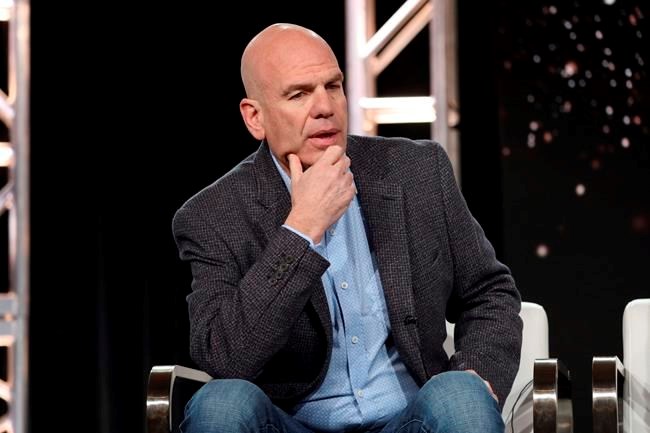LOS ANGELES ‚ÄĒ David Simon, the creative force behind stellar TV including ‚ÄúThe Wire," ‚ÄúShow Me a Hero‚ÄĚ and ‚ÄúTreme,‚ÄĚ found himself in unfamiliar territory with his latest series, HBO‚Äôs ‚ÄúThe Plot Against America.‚ÄĚ
He'd developed books into shows before, nonfiction works that demanded adherence to facts. But Simon didn’t necessarily feel liberated in adapting Philip Roth’s 2004 novel, a re-imagined history of World War II-era America made fascist in the grasp of a real-life, wildly popular hero, the aviation pioneer Charles Lindbergh.
‚ÄúThere were things I thought that worked as a novel that were not going to work in a six-hour miniseries,‚ÄĚ Simon said. He broached his concerns in a 2017 meeting with Roth, the Pulitzer Prize-winning novelist who died in 2018 at age 85.
‚ÄúI had an idea, but I didn‚Äôt have the guts to venture it. I mean, he's in the canon, he‚Äôs one of our great literary voices, and I'm a TV hack,‚ÄĚ said a self-deprecating Simon. ‚ÄúAnd I'm asking to play with the end of a novel he wrote. So I didn't have the courage to say, ‚ÄėWhat about this, what about that,‚Äô I just wanted to know if I had permission to try."
The series debuts at 9 p.m. EDT Monday, with Winona Ryder, Zoe Kazan, John Turturro, Morgan Spector and Anthony Boyle in the cast.
Simon interpreted "Roth‚Äôs story and brought it to HBO with an urgency and relevance that reflects not only the era Roth evoked but also our world today,‚ÄĚ said Len Amato, president of HBO films and miniseries.
Roth had detailed his caveats for the TV drama during their conversation, Simon said. The novelist, who relied on his family life in depicting Jewish Americans caught in a pro-Nazi Germany, anti-Semitic political wave led by Lindbergh, asked that the series' characters be differentiated from those in the book.
‚ÄúHe wanted to us to change the name from Roth to Levin, because while he had used his family and himself for the narrative, once actors are cast and other writers are coming in with dialogue, it‚Äôs no longer exactly pristine to what he imagined,‚ÄĚ Simon said. ‚ÄúHe wanted a little bit of distance for his family.‚ÄĚ
Roth also requested that TV miniseries make clear that the Jewish characters at its
Roth was insistent that the series capture Lindbergh‚Äôs achievement ‚ÄĒ his unprecedented solo flight from New York to Paris in 1927 at age 25 ‚ÄĒ and the national admiration and fame it earned him and which, in fiction, allows him to ascend to the U.S presidency.
Simon said that Roth wanted Lindbergh, who in life was anti-Semitic and opposed war against Nazi Germany, to be portrayed as the accomplished man he was. It’s the fictional Lindberg’s earned good will for his achievements that allows him to ascend to power in the novel, and Simon said Roth was adamant that the screen depiction reflect that. It was important to Roth that Lindbergh be made distinct from President Donald Trump, according to Simon.
“Mr. Roth, in his comments to me, found it astonishing that Mr. Trump, being a real estate magnate, failed casino operator and not possessed of any particular moment of heroism or public service to the country, had managed to achieve the same standing. ... He wanted to make sure that we gave Lindbergh his due, that his novel would be credible."
‚ÄúWe did,‚ÄĚ Simon said. "We went to the effort to establish in the narrative that this man became president because he was invested in real heroism.‚ÄĚ
Roth made similar comments in interviews, including one he gave a few months before his death.
When Simon is asked when he and Roth discussed ‚ÄúThe Plot Against America,‚ÄĚ the query prompts an unrelated anecdote. It was fall 2017, when Simon and longtime writing partner Ed Burns were starting to develop scripts for the series, and the day after the Nobel Prize for literature was announced. Roth was again bypassed, this time in
‚ÄúI couldn't resist," Simon said. ‚ÄúI made a joke about, 'What's this guy doing with your prize?' and he replied, very quickly, ‚ÄėAt least they didn‚Äôt give it to Peter, Paul and Mary.' I think he was still mad about Bob Dylan the year before."
He also recalled Roth re-reading the novel's ending, the section that Simon was grappling with, and remaining silent for several minutes.
“'Finally, he just closed the book and looked at me and said, 'Well, it's your problem now."
___
Lynn Elber can be reached on Twitter at http://twitter.com/lynnelber.
Lynn Elber, The Associated Press



